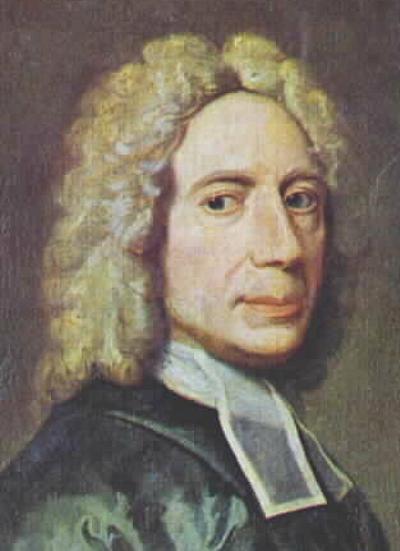
Dr. Isaac Watts
This illustrious man was born in the town of Southampton, England, in the year 1674. His father, also named Isaac, was the master of a very flourishing boardingschool in that town. This school had such a reputation that gentlemen's sons were sent there from America and the West Indies to be educated. The father was a pious exemplary, Christian, an honorable deacon of the church known as Protestant Dissenters, and was more than once imprisoned for non-conformity, or because he did not think it right to conform to all the rules and usages of the Established Church of England.
At a very early age the little Isaac began to show that fondness for learning for which he was afterward so distinguished. When only four years old, his father commenced to teach him Latin and the child made such progress as to delight his friends and become the wonder and admiration of the neighborhood. At the age of sixteen he was sent to London for better educational advantages and in his nineteenth year he professed religion, and became a member of the church under the care of Rev. Mr. Thomas Rowe, his tutor. He soon became distinguished for his religious fervor; and something more than a year after his profession, having finished his academical studies, he returned to his father's house at Southampton, where he spent the next two years in reading, meditation, and prayer. This he did, as he himself says, to acquire ampler knowledge, and to prepare for that work to which he was determined to devote his life, and the importance of which greatly affected his mind. It scarcely need be said that this work was that of the gospel ministry.
At the end of this time, not yet feeling prepared for his work, Mr. Watts went to make it his home in the family of a gentleman near London, where he stayed for two or three years, acting as tutor to the two sons. Though thus employed, he did not cease his own studies, for not only did further improvement in those which he taught, but he steadily applied himself to reading the Scriptures in the original tongues, and to a close study of all the best commentators, critical and practical.
On his twenty-fourth birthday Mr. Watts commenced the work to which he had so long looked forward, by preaching his first sermon. The same year, he was chosen assistant to the pastor of a church in London. His public labors met with much appreciation, and so great was his zeal in preaching the gospel that he brought on a severe illness, which kept him from his work for six months. But this did not discourage him, and as soon as he was able, he returned to his delightful labors with all his old fervor. He was soon called to the place of first pastor in the church where he had been an assistant, and this to the great joy of the people whom he served. This good and great man, for such he truly was, cultivated every kind of learning, and is said to have been the most thorough scholar of his age. In the year 1728 the universities both of Edinburgh and Aberdeen, in a most respectful manner, and without his knowledge, conferred on Mr. Watts the degree of doctor of divinity. He is said to have been remarkable for his quiet ease in the pulpit; and such was the beauty and propriety of his language, combined with an unaffected earnestness and solemnity of manner in speaking, that he had always a large and interested congregation. With all his other labors, Dr. Watts was not idle as a writer. His prose works are various, and of a superior style both of thought and expression.
One especially, entitled "On the Improvement of the Mind," should he read by every young person in the land. But Mr. Watts is best known by his poetical writings, which are numerous, and possess much real merit. His hymns are still sung the world over, and seem never to weary or grow old. Though his writings were enthusiastically received by the people of his time, he himself always put a very low estimate on his work, ever speaking of it in the humblest, most modest way.
The Doctor was of a feeble constitution, and suffered much from ill health throughout his whole life, yet he lived to the ripe age of seventy-four. In his last illness he proved the excellence of his principles and the greatness of his piety by his patience and serenity of mind, and by the calmness and even satisfaction with which he looked forward to death.
E. B.